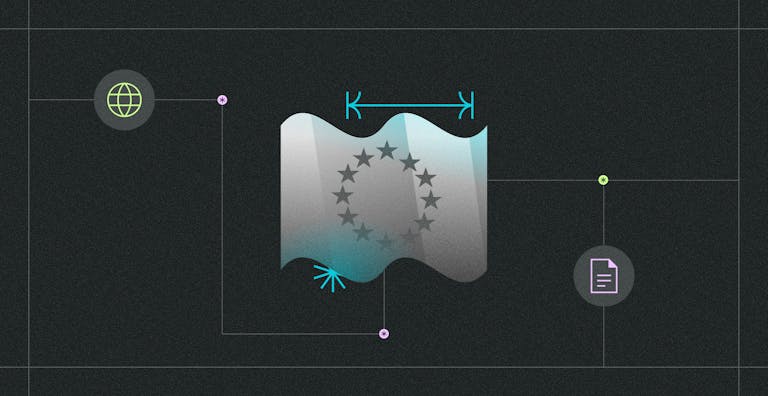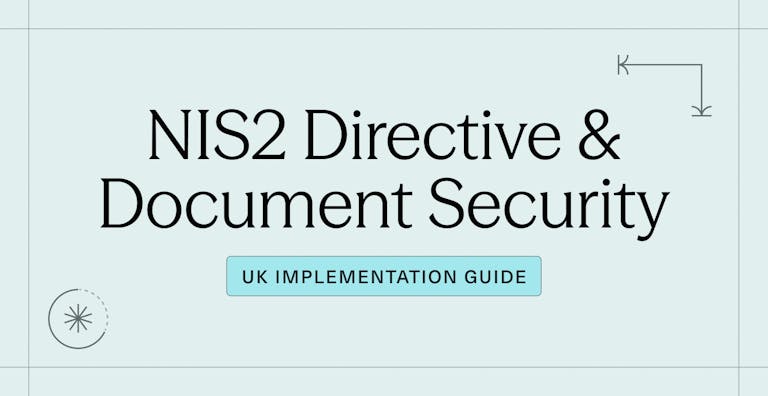Online identity verification is a control process that confirms a person is who they claim to be before carrying out sensitive actions, such as signing an electronic document, opening an account, or accessing digital services.
In a world where digital transactions are multiplying, identity verification has become essential to prevent fraud, secure exchanges, and guarantee regulatory compliance (UK GDPR, UK eIDAS). In the banking and financial sector, it forms the cornerstone of the KYC (Know Your Customer) process, which requires institutions to verify their clients' identities to combat money laundering under FCA regulations. Whether for electronic signatures, opening online bank accounts, or accessing administrative services, businesses must ensure their users' identities whilst protecting their personal data.
Warning: Not all identity verification methods are equal. The required security level depends on the transaction type and applicable regulatory framework. Inadequate verification can expose your business to legal and financial risks (identity theft, UK GDPR non-compliance, invalid signed documents).
Summary:
- Three verification levels: Electronic signatures (simple, advanced, or qualified) impose different identity verification requirements according to the security level required by UK eIDAS regulation.
- Verification process: Identity verification combines documentary analysis (official identity documents) and biometric controls (facial recognition, proof of life) to guarantee signatory authenticity.
- Data protection: Services compliant with UK GDPR and UK eIDAS ensure encryption, limited retention, and traceability of personal data collected during verification.
- Speed and simplicity: With solutions like Yousign Verify, identity verification takes just a few minutes from any device (computer, tablet, smartphone).
- Enhanced legal value: Rigorous identity verification guarantees legal security of signed documents and prevents identity theft and fraud risks.
Online Identity Verification: What Does It Involve?
For simple electronic signatures, the verification process involves sending an SMS to the registered number to ensure the person signing is indeed the designated person.
For advanced and qualified signature procedures, the identity verification process defined by UK eIDAS is much more demanding. Indeed, it must:
- establish a unique link with the signatory
- formally establish the signatory's identity
- ensure electronic signature creation by means under the signatory's exclusive control (PC, laptop, mobile phone, etc.)
- guarantee that no modification of the signed document can be made. Document integrity after signature must be ensured.
Risks and Best Practices for Personal Data Protection
Main risks linked to identity verification:
- Identity theft in case of theft or leak of sensitive documents.
- Fraud when using falsified identity documents.
- Personal data exposure if not securely stored.
- Excessive data retention, increasing compromise risk.
Best practices for data protection:
- Only entrust documents to certified providers compliant with UK GDPR.
- Verify data retention duration and conditions before validation.
- Ensure exchanges and storage are protected by encryption (SSL/TLS, AES).
- Activate strong authentication (MFA, biometrics) to secure service access.
- Choose a recognised and certified solution like Yousign, which applies the strictest standards (encryption, UK eIDAS and UK GDPR compliance, certified servers).
Protecting Strategic Documents From Identity Theft Risks
Want to learn more about growing identity theft risks and prevention methods? Discover our ebook on the subject. You'll find practical advice and case studies to prevent legal, financial, and reputational risks linked to identity theft.
Identity Verification Steps
To ensure the person signing is indeed the one designated in the contract, you must carry out identity verifications. You'll need your identity document or residence permit, and photograph it from different angles.
You'll then be asked to take a selfie from different angles to confirm physical identity and ensure the signing person and yourself are the same person.
After analysis, you can continue your signing journey. Your identity has been verified and everything is OK!
Regulations and Security and Reliability Guarantees
Identity verification is an additional guarantee that isn't legally mandatory for simple signatures.
However, for advanced and qualified electronic signatures, identity verification is a sine qua non condition.
For qualified electronic signatures, or advanced electronic signatures with qualified certificates, face-to-face identity verification will even be mandatory.
One of the flagship regulations for electronic signatures is obviously UK eIDAS regulation, which defines identity verification conditions.
However, there won't be an established or exhaustive list of which document requires which type of signature and identity verification.
We encourage you to consult our article on face-to-face identity verification to learn more about these key electronic signature concepts!
How to Know if an Identity Verification Service Is Reliable?
A reliable identity verification service must meet several essential criteria:
- Regulatory compliance: verify that the provider respects UK eIDAS and UK GDPR regulations, guaranteeing legal value and personal data protection.
- Certifications and accreditations: favour services recognised by trusted authorities or with security certifications (ISO 27001, UK eIDAS Qualified Trust Service Provider, etc.).
- Process transparency: the service must clearly explain verification steps, required documents, and data retention duration.
- Data security: ensure storage is encrypted, time-limited, and accessible only to authorised persons.
- User experience: a reliable service combines security and simplicity, with quick and intuitive verification accessible from any device.
In summary, a reliable service is simultaneously compliant, certified, transparent and secure, whilst offering a smooth user experience.
Which Tools to Use to Guarantee My Data Security?
To effectively protect your data during identity verification or electronic signature, several tools can be deployed:
- Advanced encryption (AES, SSL/TLS) to secure information transmission and storage.
- UK GDPR and UK eIDAS compliant solutions, guaranteeing legal value and data protection.
- Strong authentication (MFA, biometrics) to prevent unauthorised access.
- Secure and time-limited storage on certified servers.
- Trusted providers with security certifications and UK recognition.
Yousign Integrates All These Guarantees
The solution applies the strictest standards for encryption, compliance (UK GDPR, UK eIDAS), and data security. By choosing Yousign, you benefit from secure, simple, and legally valid identity verification and electronic signatures throughout the UK and European Union.
Take it to the next level
Try Yousign free for 14 days

Frequently Asked Questions About Identity Verification and Electronic Signatures
What Is Identity Verification?
Identity verification is a process to confirm that a person is who they claim to be. For electronic signatures, it relies on comparing official documents (identity card, passport, etc.) and, where applicable, biometric controls (facial recognition, proof of life).
Why Is Identity Verification Important for Electronic Signatures?
It reinforces electronic signature legal security by avoiding identity theft risks. It's also a regulatory requirement in many sectors (banking, insurance, property) and guarantees signed document legal validity.
Is Identity Verification Mandatory in B2B?
In B2B, identity verification isn't systematically mandatory. It depends on the chosen electronic signature level and business sector. For simple signatures, an email address or SMS code may suffice.
However, where regulations impose advanced or qualified signatures (e.g. sensitive contracts, regulated sectors like banking, insurance, or medical), identity verification becomes essential. With Yousign, you can adapt the control level according to your needs and legal obligations.
How to Prove a Signatory's Identity?
A signatory's identity can be proven by verifying a valid official document (identity card, passport, driving licence), combined with additional controls like SMS authentication, facial recognition, or proof of life. According to the electronic signature level (simple, advanced, or qualified), requirements vary: the higher the level, the more rigorous identity verification must be.
With Yousign, these steps are automated and UK eIDAS compliant, guaranteeing signature legal validity.
How to Combine Identity Verification and Electronic Signature?
Identity verification integrates directly into the electronic signature journey. According to the required level, it can range from an SMS code to complete documentary and biometric verification.
Which Documents Are Accepted for Online Identity Verification?
Most often, it's a valid official document: identity card, passport, or driving licence. According to the required verification level, proof of address or proof of life (real-time photo or video) may also be requested.
Is Identity Verification Compliant With UK eIDAS Regulation?
Yes. Yousign's identity verification solution respects UK eIDAS regulation, guaranteeing that each electronic signature is legally valid and enforceable throughout the UK and European Union.
How to Trace and Store Verified Identity Data?
All data collected during identity verification is traced and securely stored in compliance with UK GDPR and current standards. Yousign ensures information confidentiality and implements strict technical and organisational measures to guarantee data integrity and traceability. Their retention is limited to what's strictly necessary to respect legal and evidential obligations.
How Long Does Identity Verification With Yousign Take?
The process is quick: it takes just a few minutes to upload documents and validate identity. Everything is designed to offer a smooth, secure experience achievable from computer, tablet, or smartphone.
Which Document Types Can Be Automatically Verified?
With Yousign Verify, several categories of data and official documents can be automatically controlled:
- Identity documents (via image/photo, video, or face match): identity card, passport, residence permit, driving licence.
- Banking documents: sort code/account number, with compliance, integrity, format verification and correspondence with declared data.
- Company and business data: legal existence, legal information, legal representatives, directors, via official databases.
What's the Difference Between Documentary and Biometric Verification?
Documentary and biometric verification are two complementary approaches to authenticate a person's identity:
Documentary verification:
- Principle: automated analysis of official identity documents (identity card, passport, driving licence)
- Controls: document authenticity, data consistency, falsification detection
- Technology: optical character recognition (OCR), visual security analysis
Biometric verification:
- Principle: identification based on person's unique physical characteristics
- Methods: facial recognition, proof of life (video selfie), comparison with document photo
- Objective: ensure the present person is indeed the document's legitimate holder
In practice with Yousign:
- Image check = documentary verification alone
- Video check = advanced biometric verification with proof of life
- Face match = combination of both: document + facial recognition
These two approaches complement each other for optimal security: documentary control verifies identity document authenticity, whilst biometrics confirms you're indeed its legitimate owner.
With Yousign Verify, you choose the verification level suited to your security and regulatory compliance needs.
What Are the Online Documentary Verification Tools?
Online documentary verification relies on solutions capable of automatically analysing and authenticating identity documents or justifications provided by users. With Yousign Verify, you benefit from a comprehensive tool compliant with UK standards, combining documentary control, biometrics, and video verification to secure your digital journeys.






